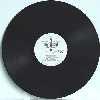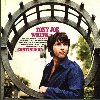


 |
 |
 |
| USA DJ version | USA | Germany |
...CONTINUED.
Contemporary music makers depend heavily on their early environments. Muddy Waters sings of fickle woman because he's known a few; Aretha Franklin sings af heartbreak because she's been there; Tony Joe White sings of the South because his roots are there.
Swamp music is what they're calling his bag, and it is not a derogatory term. Tony Joe is not the only exponent of swamp music, but he's the one who took it to the world.
Down below the Mason Dixie line - where polk salad grows in dense patches and alligators lurk in the muddy swamps and the small boys go bullfrog hunting - the music has one common denominator, honesty. To the uninitiated, it can be shocking, weird and maybe even horrifying, but it's real and that's what counts.
Polk salad, cotton fields and bullfrog hunting may sound far fetched to some people, but it is no lyric hyperbole hype. This is as real as black and white. Tony Joe describes swamp music as "down to earth, a sort of earthy soul music. They are truthful songs sung by people who believe in them, people who've been there and know where it's at."
Tony Joe, who's 25, was born in Oakville, Louisiana, and he'll never forget it. The honesty which rings through his songs was deeply ingrained many years ago. "I spent the first 18 years of ma life down there, ma folks raised cotton and corn. There were lotsa times when there weren't too much to eat, and I ain't ashamed to admit that we've often whipped up a mess of polk salad. Tastes alright too... a bit like spinach."
Swamp music comes from that part of country music which originated in the lowlands of the South, the place where black and white people used to work side by side in the fields. It is remarkably different from the mountain influences of country music, which retained something of the old English and Elizabethan folk song approach. And of course, lowlands country music was more into the blues than were the mountain musicians. Thus swamp music has found equal following among both white and colored people.
Tony Joe spent seven years wearily working the small night clubs of the South before deciding to drop his band, and start singing solo using his own material. He went north to Nashville and snapped up by Monument.
Polk Salad Annie was released in December of 1968, and finally made it in July 1969 because of one Monument promotion man's belief in Tony Joe. Since then, it's come together like a magnet in a bunch of steel pins. Ed Sullivan and Tom Jones want him for TV, Johnny Rivers and Dusty Springfield want to record some of his swamp songs.
Tony Joe now lives in Corpus Christi, Texas, with his pretty wife and two kids. But he dearly misses the swamp country.
"I got a brother back there and we go fishing together. Every now and then, I go back down there and get some soul food for song ideas. I think you gotta have been raised in swamp country to really get in there and funk it up. It is very truthful and you can't fake it."
As you'll hear on this album, Tony Joe isn't faking it. All new songs, his own originals, all given that inimitable touch which is swamp music but more important, which is uniquely and only Tony Joe White.
After listening to the album, you can't help but feel that youve been there. And if that's not honest and beautiful communication, I don't know what is.
Richie Yorke, Rolling Stone Globe and Mail, Toronto.
New Musical Express, England.
Billboard, 1968.

|
|
|
|
|
|